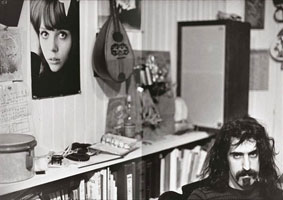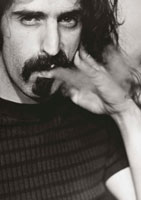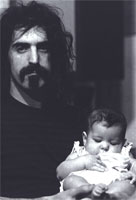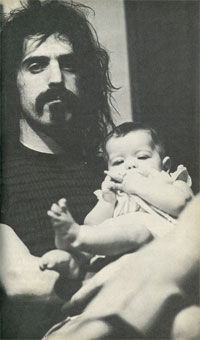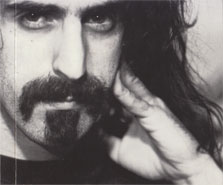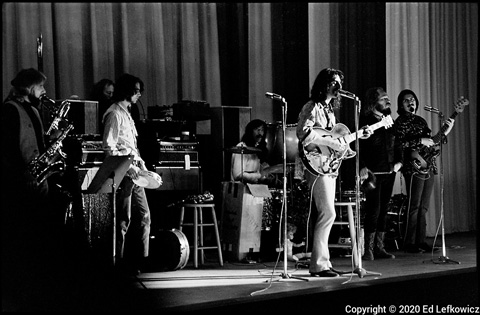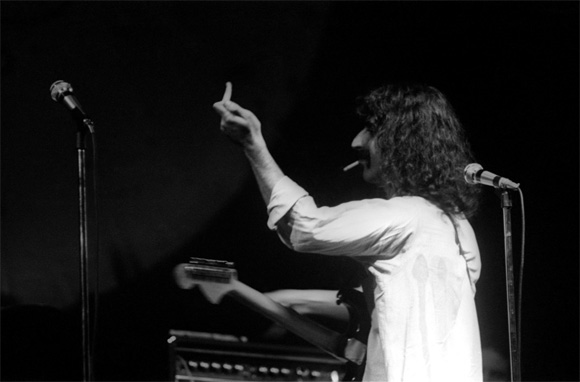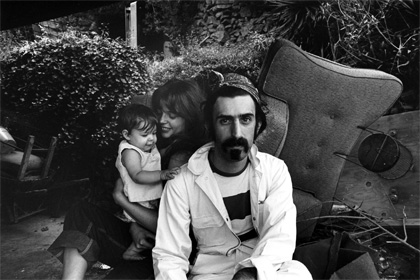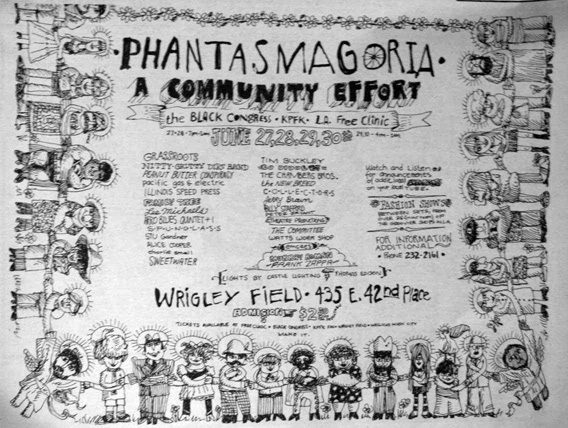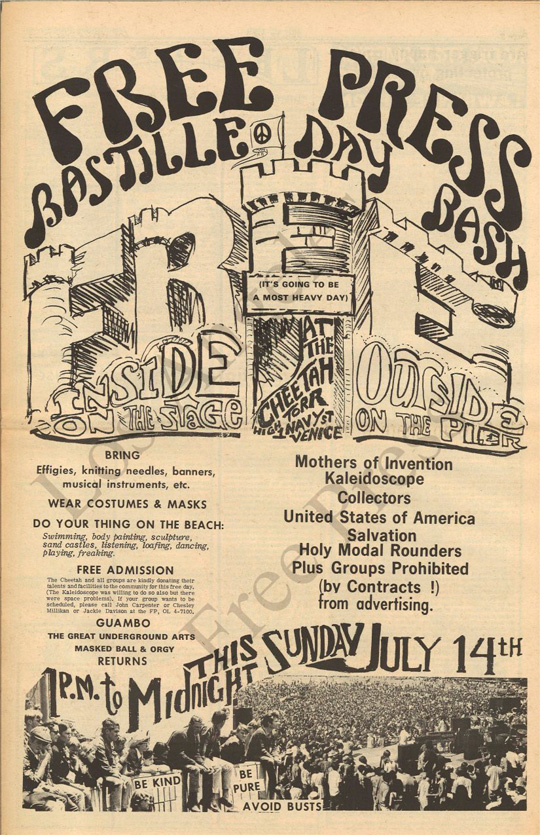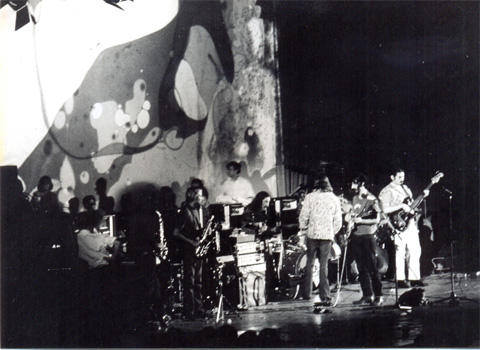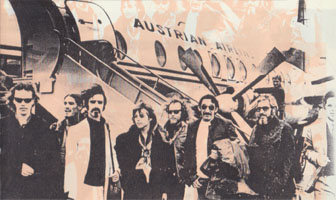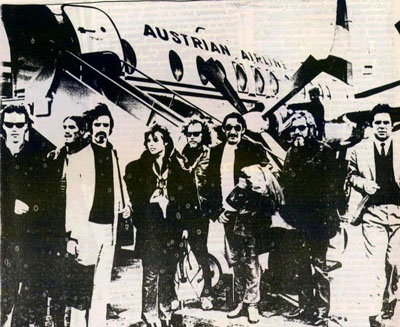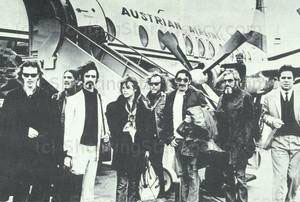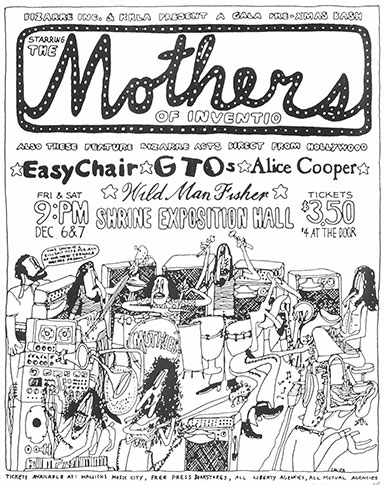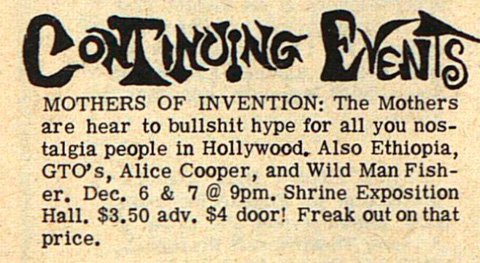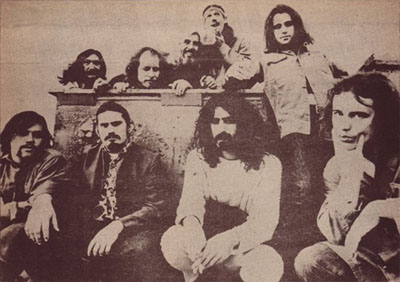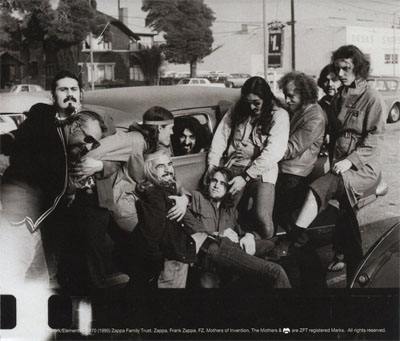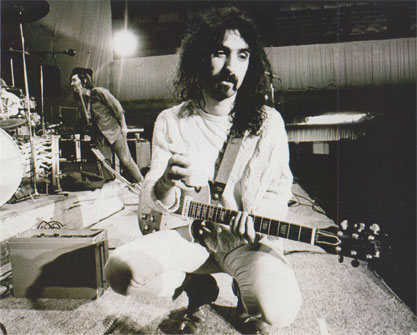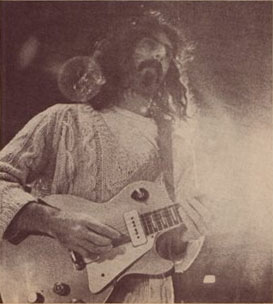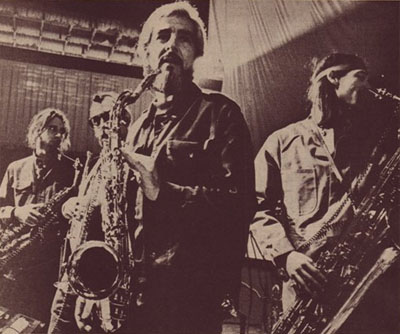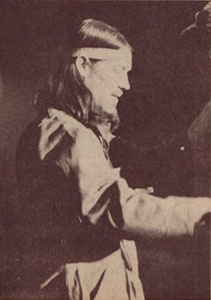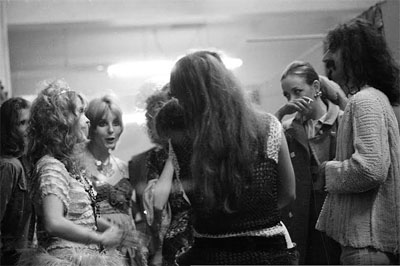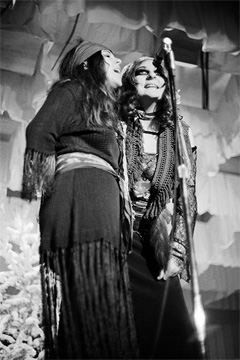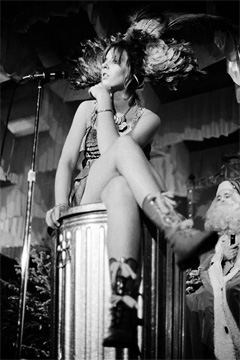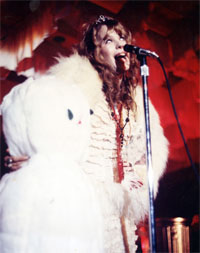Billy Mundi & Rhinoceros
Still without a drummer, ex-Daily Flash member John Keliehor is brought in for the recordings. Not long into 1968 drummer Billy Mundi (ex-Mothers Of Invention) is the final piece to the puzzle completes group who soon gather in Los Angeles to begin rehearsals at a Hollywood theatre.
Mundi became an integral part of The Mothers' line-up and is featured on the classic albums, Absolutely Free and We're Only In It For The Money. Eventually however, he became disillusioned by the band's financial plight and, living in dreadful conditions in New York's Chelsea Hotel, was ready to jump ship by December 1967. As Mundi recalls: "I was on a short break from the Mothers and went to New York to speak to Jac Holzman. He wanted me to check out a group of musicians that Elektra had corralled together to do something . . . I told him I had a few more dates to do and would fly out to LA and see. I did and I stayed. I began rehearsing and joined."
Billy Mundi was so pissed off by this time that he quit. When Absolutely Free came out we were each given our complimentary copy. Billy melted his copy, made it into an ashtray, showed it to Frank, and said, "I'm quittin' the band!" So he left and joined a band called Rhinoceros.
[Jac Holzman] offered Billy Mundi a huge amount of money, a place to live, the whole package—we'll make you a star, you'll work with these top-grade musicians instead of those comedy guys, we'll make a supergroup and call it Rhinoceros. And where the fuck is Rhinoceros now? But I don't blame Billy for taking the job, because at that time we were so poor he was living in the Albert Hotel and he couldn't get enough to eat—he used to come in and tell us how he'd quell his appetite by drinking the hot water in the shower in the Albert Hotel, which could be a life endangering experience. When somebody comes up to you and says, you're going to get something to eat, and not only that, you'll be in a super-group called Rhinoceros, I couldn't even advise him to stick around.
Essra Mohawk
I remember that they called me an asked me to be in the band when they were first putting it together. They'd already heard me so I was never asked to audition, just to join. I really wanted to join, especially since Billy Mundi had played in The Mothers with me and I loved the way he played back then. He quit The Mothers right after I did, but I was still signed to Frank [Zappa] and Herbie [Cohen] and they wouldn't let me join Rhinoceros. I've always regretted that.
"Frazier Mohawk Bio," The Studio At Puck's Farm
[Frazier] Mohawk had become friends with Paul Rothschild who had become executive producer at Elektra. That same label, to which he had originally tried to sign Buffalo Springfield, eventually hired him as in-house producer on the west coast. With Rothschild, Mohawk put together the group Rhinoceros which included Jon Finley, Mike Fonfara and Peter Hodgson of the Canadian group Jon-Lee and the Checkmates, Billy Mundi (Frank Zappa), Danny Weis (Iron Butterfly), Doug Hastings (Buffalo Springfield) and Alan Gerber. The concept of a "Super Group" was to put together people who had come from other established groups but were all lead performers in their own right. In the subsequent advertising campaign for the group's debut album for Elektra, Mohawk arguably coined this phrase Super Group for the first time.
January 28, 1968—Convocation Hall, University Of Toronto, Ontario, Canada
Charles Ulrich, Zappateers, January 28, 2016
A review of the Toronto gig in the Daily Star includes a list of some of the instruments played. It doesn't state that there were two drumsets, but it does mention electric trumpet, vibraharp, and tympani. JCB wouldn't have had a chance to play those instruments if Billy was already gone and he was the only drummer.
So, unless there were some unlisted gigs between Toronto and Providence/Fall River, I think 68/01/28 Toronto was Billy's last gig.
The Varsity, January 24, 1968
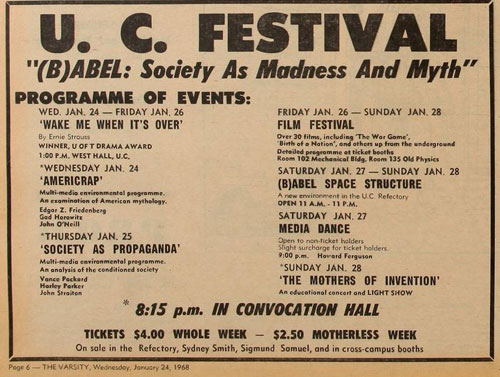
The 1968 festival was called "(B)ABEL: or Society as Madness and Myth." [...]
Two artists had planned an ambitious "total environment" in the cafeteria, a sound-and-light show in Convocation Hall run through an intricate "black box," a film festival, and a concert by the Mothers of Invention. Because of budget constraints, [Bob] Rae had to force the artists to cut back. Rae was further dismayed by the Mothers of Invention, who arrived three hours before their concert and told him they needed a new sound system in Convocation Hall, which Rae "broke every rule" to get. The Mothers concert violated the fire code, as the hall was stuffed beyond capacity. Faculty were outraged, and Frank Zappa ended the concert by "pouring shaving cream in every possible orifice of the huge organ at the front of the hall." The famed "black box" didn't work, the artists' "total environment" was incomprehensible (one critic noted that "the intellectual aspects of the environment are certainly very subjective, if not dubious"), and the festival ran a huge deficit, quoted in some sources as upwards of $6,500.
M.B., "Head Mother Zappa Calls Patrons Cretins," Globe And Mail, January 29, 1968
University College of U of T paid the Mothers of Invention $3,500 for their performance at Convocation Hall last night.
In return for that substantial sum the U.S. rock group, led by Frank Zappa, head Mother, played with dolls, lifted skulls out of a brown box marked "authentic poster of Down to Middle Earth," threw Crazy Foam at the audience, smashed toy cars, pounded a pick into a clothing store dummy, and made obscene gestures.
"The Mothers give you the kind of excitement they think you deserve," said a mustached boy next to me.
"We always play this kind of music when we have 2,500 cretins all sitting around waiting to be entertained, thinking they are making it on a cosmic level," said Frank Zappa, going into the Mothers' version of My Boy-Friends' Back, a very poor version of a late-Nineteen Fifties rock 'n' role tune. Singer Ray Collins made silly motion and sang in falsetto.
Zappa and his mothers might have thought Toronto was "nowhere" on a cosmic level, but there was no excuse for the group's performance last night. It was insulting.
Paul McRae, "Wailing Mothers Climax (B)abel Festival," The Varsity, January 29, 1968
Inside strobes flashed, 10 shaggy Mothers pounded the organ and drums, movies and patterns scanned the walls and ceiling, fingers played up and down the bass.
[...] Grease globs glistened, moving on a huge white screen behind The Mothers.
Cymbals, sawdust and confetti rain, low rumbling electronic moans, colorful sounds.
[...] The mothers must have the biggest instrument section of any pop group in America, but they rely mostly on drums, organ and bass, fronted sometimes by leader Frank Zappa's guitar. In the noise, voices mingle and disappear, although once Zappa ran through the words of a song first. At any given time they may use saxophones, clarinets, guitars, kettle drums, trumpets, cymbals and tambourines.
There is no pattern to a Mothers' concert. They meander on stage and seem to pick up instruments at random. Zappa insults the audience—"We cater to the lowest taste"—they love it "Cretins wanting to be entertained."
"Seeing as bow we're pandering to your lowest tastes, here it is: another piece of poop. Something you don't have to think about. You just sit back there and tell yourself you're making it at a comic level."
Frank Zappa was standing before a microphone on the stage at Convention Hall, the stage littered with spaghetti and crazy foam and colored lights and amplifiers with dolls' heads and smashed-up toy cars, with sawed-off mannequin wearing a gas mask, with kettle drums and drums and pianos and all sorts of electric machines. It looked like some sort of pop art battlefield.
Strings of white balloons were hanging from the ceiling and colored lights and weird—I suppose you'd call them psychedelic—images were swirling around on a huge white screen behind the stage, between Frank Zappa and the front row of seats, 20 or 30 hippies sat on the floor [...].
The number of Mothers varies (legend has it there are 200 in all) but there were nine, including Frank Zappa (a kind of hippie Jesus figure) on stage last night. And they made it a wild and tremendously exciting evening.
[...] In fact, there's more musical talent in this group—which includes electric trumpet, electric tenor sax, alto sax, vibraharp, electric piano, electric guitar, electric bass, drums and tympani—than all but 10 of the groups on the Top 50 put together (10 maybe putting it too high).
[...] His between-songs patter?
"What's wrong with you, people? Don't you have any natural rhythm? Every time we play for a white audience it's always the same."
[...] Before the performance last night actually began, and while a couple of the Mothers were doing a satire on groups tuning up, [Ray Collins] began emptying the contents of several cardboard boxes onto the stage—bits and pieces of dolls, broken toys, all sorts of junk.
For about five minutes he walked the lower half of a mannequin around the stage making a variety of obscene gestures. And later on, he emptied a can of Crazy Foam (a substance resembling the kind of shaving cream that comes in an aerosol can on to the stage, then picked it up in handfuls and threw it at the audience, some of whom responded with handfuls of spaghetti. It was a wild scene.
[...] During that pre-performance tuning-up jam session, [Don Preston] started fooling around on the piano and a souped-up amplification system attached to it, creating a collage of music and noise and music-noise—machine guns and helicopters and wild murmurs from outer space and 20,000 leagues under the sea, subways and screeching tires and searching mind-shattering sounds that made you want to close your eyes and take off.
Only if you closed your eyes you missed the light show, which was at least 20,000 light years better that the Jefferson Airplane light show at O'Keefe Centre last year.
The show lasted two hours, which was about two hours too short for me. It included six or seven excerpts from what the Mothers call Underground Oratorios (the best being a number called America Drinks and Goes Home), and a couple of big-beat, jazz-rock, highly improvisational instrumentals. To say nothing of the funniest and maybe the best performance of God Save the Queen I've ever heard. I rather like the song when it's played off-key-
These unconventional very pretentional, super-inventional Mothers—I loved them. All us Mother-swingers did.
Art Tripp
Patrick Peterson, "Chiropractor From California Has A Song In His Heart," The Sun Herald, August 13, 2000
Tripp started music school in 1962 and played with the Cincinnati Symphony as a student. After moving to New York City, he met Frank Zappa and began playing with Zappa's band of classically trained rock musicians.
"There was a lot of improvisation," Tripp said. "I thought I'd died and gone to heaven."
Through a friend of his wife's, Art [Tripp] was introduced to Frank Zappa's recording engineer, Richard Kunc. When Zappa was informed by Richard that he had met a percussionist with just the type of background and experience that Zappa was looking for, Art was invited to meet Frank and play for him at Apostolic Studio in New York's Greenwich Village.
This gal I was living with at the time, [Adrian], got a job as a social worker up in Harlem, in order to support us while I was going to [the Manhattan School of Music]. So anyway, this girl who was an associate worker of hers was named Patricia Kunc and that, of course, was Dick Kunc's wife [...].
She had heard that I worked for six months with John Cage in Cincinnati, and I played with the symphony and I had done ballet and all this crap. So one thing let to another and Dick got interested [...]. He told me about this guy he was working with—Zappa, and I had just heard Zappa for the first time, it was like two weeks before then. [I have] heard Absolutely Free, and I thought, "Man! This stuff is too much!" I just couldn't believe it, because I hadn't heard anything like it before. [...] When I heard that, I thought it was something else, and at the time, if anyone said, "Hey, who's your favorite rock'n'roll group?" I'd say, "Well, it's Frank Zappa and the Mothers of Invention." [...] So I told Dick, "Look, I realize you're doing work down there, I could really use the money if you need to hire studio guys, if you need somebody to play bongos or xylophone or anything like that, because, I could really use the jack." So, he said, "Yeah, I'll let you know." [...]
So a few weeks later, he gave me a call and said, "Look could you come down Friday to the studio?" I said, "Yeah, absolutely." [...] So, I went down there and he took me into the studio and I met Frank and Herbie, you know, and [...] Pamela Zarubica and all their hangers-on and all that shit. I was pretty impressed. [...] So finally Frank asked me a couple of questions, he asked, "Do you play regular drums?" I said, "Yeah, but it's been a long time!" He said, "Well, come on out here and play something, and we walked out in the studio, and there was a couple of sets of drums behind the baffles. One set, I found out later, was Billy Mundi's drums, and he just hadn't picked them up yet [...]. I sat down, and asked, "Well, what do you want me to play?" He said, "Play anything you want to play." So I just started playing. Just free-form stuff, which I always enjoyed doing. I played for quite a while [...]. I just kinda stopped and looked up and Frank was standing there with his mouth open. He said, "Man, you're a monster!" [...] He brought Roy in and we played this little thing in five meter. He said, "This is too much, I'll tell you what, are you doing anything this weekend? Because we're going up to play a couple of gigs in north state New York." [...] And I said, "I don't know your music or anything about it." [...] He said, "Don't worry about it, if you need to know, just watch Jim." He said, "Every time I point to you, just start playing a drum solo." I said, "Yeah, I can do that!" (Laughs) He said, "By the way, it'll be about $500." I said, "$500?" Adrian was making about $100 a week or something. I never saw $500.
On the afternoon of February 17 [24?], 1968 I was sitting in a motel room wondering what new and exciting things were ahead of me, having joined the Mothers of Invention. I'd just left Zappa's room where we talked about music in general, and also a little about the show coming up that evening.
Jimmy Carl Black, interviewed by Ken Shimamoto
K: How did you feel about the direction the Mothers took later on (adding musicians to the band, Frank "cutting and pasting" albums together in the studio)?
JCB: After Frank became leader of the band in 1964, he was the BOSS. We really didn't have much to say about anything he wanted to do. I, personally, liked adding the other musicians because we had a bigger sound. I didn't particularly enjoy playing with Billy Mundi because we were too similar in our styles. When Artie Tripp came in it was the best time for me. Him and I complimented each other and we really had a tight rhythm section with Roy Estrada. Frank was always in complete charge of the music and usually we, as the band, didn't hear the final product until it came out on record.
"Frank was continuously on the prowl for new ideas and inspirations," Tripp says today, speaking from his home in Mississippi, "so just about anything we discussed was used. To be associated with a guy who basically favoured 'anything goes', but at a high level, was heaven for me. I shared Frank's counter-culture, anti-mainstream philosophy, and in those days we made fun of everything."
February 24, 1968—Reid Athletic Center, Colgate University, Hamilton, NY—Art Tripp's First Gig
We did a small tour. These were the first gigs that Art Tripp played in the band. [...] The first gig was at Colgate University in upstate New York and we didn't have a rehearsal. We played in a basketball gymnasium so you can imagine what it sounded like, really funny. Frank had all the parts written out for Art. I was back into playing the drums full time so I carried all the beats. All Artie had to do was read his parts and listen to me. It worked quite well for us.
Charles Ulrich, February 9, 2012
Art Tripp, Javier Marcote, and I have determined the exact date of Art's first gig with the Mothers of Invention.
Art said that his first two gigs were in upstate New York on a Saturday and Sunday, with one of them at Colgate University.
Javier found a review of a (previously-unlisted) concert at Colgate University (in Hamilton, NY) on Saturday, February 24, 1968. I already had a confirmed listing for a concert in Syracuse, NY, on Sunday, February 25, 1968.
I sent Art a list of known gigs between October 28, 1967 (first known gig after the first European tour) and February 18, 1968 (last known gig before the weekend in question), and he said that none of them looked familiar.
So Art's first gig with the MOI was February 24, 1968.
Charles Ulrich, February 24, 2012
Art says he auditioned on Friday (February 23) and played his first gig the next day. FZ just told him to watch JCB.
FZ had Art start the 2/25/68 Syracuse show by playing a drum solo.
In the 7/18/75 WYEP-FM interview, Art said that "Billy Mundi had just quit at the time, I guess he was gone about a month or two months" (4:15) or that he "had quit about a month before" (21:20).
Today he said that he had thought Billy had been gone several weeks, but on the other hand he believed that the drums he auditioned on were Billy's drums, still left at Apostolic Studios, so maybe he hadn't been gone that long.
February 25, 1968—War Memorial Theater, Syracuse, NY
So, we went up and did those two gigs. I think it was the second gig we played. It was in this big indoor amphitheatre, and I think it was in Ithaca. At any rate, we were all sitting around backstage before the show and he said, "Why don't you just go ahead and start us off?" I said, "You mean, just go out and play by myself?" I said, "Alright, great!" So I just went out there and started wailing, you know? The guys started coming on the stage and we just played the show, every time a piece of music came up and I didn't know what it was, I just looked over at Jim and see what he was doing and I would just mimic that, that's how I started.
February 29, 1968—NARAS—10th Grammy Awards Dinner, NYC
"NARAS Lines Up Top Acts For Award Dinners Feb. 29," Billboard, February 24, 1968, p. 3
NEW YORK—NARAS has lined up the entertainers for its four-front Grammy Awards dinners Thursday (29). Steve Allen will emcee the New York event at the Hotel Hilton. The Mothers of Invention will perform, along with Woody Herman and His Herd. In addition, the Ray Charles Singers and Margaret Whiting are expected to be among those performing songs.
We played the Grammy Awards in '68 at the plush NY Hilton. Steve Allen was the host that year, Woody Herman and his Herd was the house band. When they drew the curtain up for our performance Ray walked over to Steve and said, "How's your bird"? Allen let out a big horse laugh, and the guys in Herman's band doubled over in stitches.
The Mothers were invited to play at the National Academy of Recording Arts and Science (NARAS) dinner in New York. The resultant rumors in New York music industry circles cried for a little clarification.
The first rumor concerned The Mothers' playing "psychedelic" music, which Frank introduced with "All year long you people manufactured this crap, and one night a year you've got to listen to it!" He continued with "your whole affair is nothing more than a lot of pompous hokum, and we're going to approach you on your own level." In further describing the "psychedelic music" Frank added, "so we played some of the ugliest shit we could do . . . they expected that we play ugly shit . . . I have the program which says 'Music By Woody Herman; Entertainment by The Mothers of Invention.' They figured it was part of the 'entertainment.' They booed us after we were finished."
Even Frank doesn't know how The Mothers were selected to play NARAS. "I guess everybody thought it would be a good gag. A lot of people were really offended that we were there. There were some people that really liked it. I thought we played very well. I'll tell you a couple of receptive people: there's John McClure, who is head of Classical A&R for Columbia Masterworks, one of the last people in the world I would expect to like what we do, came up—you see we played twice: we played during the show and we played while people were putting their coats on; you know, the relief band. Woody Herman already had packed up, collected his bread and split. We're still honking away—and he said, 'When you get tired of that dip shit label you're on, why don't you come and make a deal with Columbia Masterworks.' I though that was kind of nice of him."
"And then Jerry Wexler comes creeping out of the woodwork and he says, 'My son's in college and he has all of your records.' I said, 'Gee, I hope it hasn't affected his work!' He was really nice. He really like it."
Of all the bands to play at the Grammys, I couldn't understand why it was The Mothers of Invention. It was a Pre-ceremony Dinner held in some hotel and I think we played for about 30 minutes, and I'm telling you Man, we went all the way on that one! We really got out there!
You ever heard of the Grammys? Do you know anything about NARAS? Have you ever heard of the NARAS credo? That's that little— I saw one one time. The one that I saw was written by Stan Freberg. Okay? We were the entertainment at the Grammys in 1967 or '68 in New York. I saw this piece of paper and it said in part that, "These selections are made on artistic merit alone and have nothing to do with unit sales." Right? Sure.
The award ceremony for the 1966 awards took place on February 14, 1967. The programme read "Music by Woody Herman; Entertainment by the Mothers of Invention". NARAS was looking for credibility; Frank didn't intend to give it to them. His resolve hardened when he read the otherwise hilarious Stan Freberg's pompous Credo that NARAS judged records "on the basis of sheer artistry and artistry alone".
When the Mothers took the stage, Frank went for the fat cat's throats: "All year long you people manufactured this crap, and one night a year you've got to listen to it! Your whole affair is nothing more than a lot of pompous hokum, and we're going to approach you on your own level."4 The band then proceeded to ravish 'Satin Doll', the tune with which the Woody Herman band had opened the evening, dismembering dolls and handing the limbs out to the stunned audience. The only bright note in an ugly evening was when John McClure, head of Classical A&R for Columbia Masterworks, approached Frank to say, "When you get tired of that dipshit label you're on, why don't you come and make a deal with (us)?"
The New York chapter of NARAS met the following Monday and told one another how disgusting it had been. "Everyone rolled their eyes in the back of their heads and said, 'What a schmuck, what a tasteless dope,'" said Nick Perito. "The idea (in inviting Zappa) had been to lend some energy to a prestigious affair. He turned it into a bar-room."
March 15-16, 1968—Thee Image, Miami Beach, FL
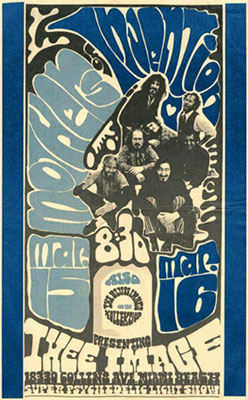
Florida, of sorts, a place that Zappa had known well ever since he inaugurated Marshall [Brevetz's] Thee Image (forerunner to Thee Experience, the rock hall whose name he took with him to California when Jim Morrison shut out the lights on rock 'n roll in Miami, March 1969), warming up the club for bands like Led Zeppelin, Moby Grape, the Jefferson Airplane, Spirit, the Grateful Dead, and a host of other bands that Marshall [Brevetz] brought to Miami regularly in the heyday of 1968.
Thee Image was Miami's biggest and best known psychedelic rock club, even though it was only open for about 13 months. It was located in a former 32-lane bowling alley at 18330 Collins Avenue, just North of Miami in Sunny Isles Beach. It was principally operated by a band from Tampa, FL, originally called The Motions, who had changed their name to Blues Image in an homage to The Blues Project. Blues Image were reputedly hip Florida's best live band, with twin drummers and a funky, swinging sound. Besides helping operate the club, they were the house band and apparently played just about every weekend there, whether or not they appeared on the bill.
Thee Image opened on March 15, 1968 with The Mothers of Invention, and the last gig that I can find was April 26, 1969 with Ten Years After.
[...] Visiting bands were impressed with the Blues Image, but Frank Zappa suggested that they would have to go to New York or Los Angeles to make it, and Eric Burdon invited them to Los Angeles, so in Spring 1969 they closed Thee Image and moved to Los Angeles.
GL Sullivan, "Thee Image," Art Galaxy
The World had started to become too big and many of the local "hippies" needed a smaller, cooler, hipper more private place to hang. Soon, Thee Experience opened up a few blocks down the road, in a biker bar. The better San Francisco and west coast bands were playing there, instead of The World. Then, Thee Experience had booked the Mothers of Invention to appear. The club was too small, so they found an old 32 Lane Bowling Alley on Collins Ave. and opened up Thee Image. The Mothers of Invention opened Thee Image on March 15/16, 1968 and the rest is history. Thee Image was the ultimate experience. There were 3 stages with black lights and day glow paint everywhere. A shop sold all your psychedelic needs. And, of course there was the Meditation Room . . . The house band was the Blues Image. It was open Fri., Sat., & Sun. nights, with the admission price between $2 and$3, depending on who was performing.
[...] In March 1968, when the Blues Image opened for The Mothers of Invention at thee Image and Frank Zappa saw them for the first time, he commented that Mike Pinera was one of the best Blues Guitarists in the country . . .
I remember a band called Blues Image opened for us at Thee Image and that is where I met a guy named Joe Lala.
April 1968—Back To L.A.
"The Mothers move back to California in May, to Los Angeles."
When asked about the reason for the move, Frank began with, "Because we don't like San Francisco. No, we're moving because we don't like New York. I don't like New York, which is probably the basis for it. It makes me sick to stumble over people dying in the street. It's a drag. I don't like it. I don't like the weather, and so on and so forth and so on and so forth."
April 26, 1968—Taft Auditorium, Cincinnati, OH
Hap O'Daniel, "Mothers Blow Minds With Strong Music," The Cincinnati Post & Times-Star, April 27, 1968
Despite the presence of some $15,000 worth of electrical toys on the stage of Taft Auditorium last night, there weren't any fuses blown—but a lot of minds were.
The electrical setup, looking not unlike a battery of computers, was the property of the Mothers of Invention. This nine-man group played two concerts and firmly confirmed themselves as the top musical group—accent on musical—in the rock field unless someone better comes along. That isn't likely to happen soon; Frank Zappa, music director of the Mothers, seems to be just warming up.
The concerts, presented by Roger Abramson and Bruce Sherrill, drew less than 3000. Those who attended, however, including fans already familiar with the Mothers' music, were in for a surprise. Each long set yielded only three or four songs, with the accent on extended instrumental solo or ensemble work rather than vocal.
The Mothers can't really be called a rock music group; that term is too confining. They simply make music, incorporating rock, jazz, blues, Indian music, serialism, electronics aleatoric (chance) elements and extra musical effects into a fascinating, mind-boggling sound.
WITH NINE MEN, including two percussionists, amplified to the hilt, the Mothers are obviously "heavy," sound-wise, but never at the expense of the music.
Many so-called "phychedelic" groups who rely on sheer volume could take a lesson from the Mothers, who produce the same trippy effect while still allowing the melodic line, the harmonics and the internal structure always to be clearly heard. Percussion in used harmonically as well as rhythmically.
ZAPPA, AN easy-going, ingratiating personality, is an excellent blues-oriented guitarist. Bunk Gardner and Ian Underwood both play amplified saxophones and are outstanding reed men whose solo and ensemble work reveals ample jazz roots. Don Preston provides inventive organ, electric piano and myriad electronic effects; bassist Roy Estrada a solid line and drummers Jim Black and Art Tripp precision time while driving the group.
Lead vocalist Ray Collins, who also blows a mean harmonica, inspires much of the fun with his falsetto voice and his uncanny ability to mimic other vocal styles, from the manufactured Supremes to the swing-era dance floor. Motorishi adds vocal fun, tympani and other percussion and Zappa occasionally contributes a foxy vocal. The group's satire is valid, accurate and good-humored, never vitriolic.
LAST NIGHT'S most exciting moments were instrumental. "King Kong," from the group's forthcoming soundtrack album—they're making a surrealistic documentary film, inspired by this music—featured Estrada's unwavering drone bass, solos by Zappa, Preston and Underwood, electronic effects and a percussion crescendo coda.
"Orange County Lumber Truck," an instrumental medley of songs from "We're Only In It For The Money," the group's hot new Verve album, and "Lumpy Gravy," Zappa's just-released rock ballet, included a wild vocal collage, a xylophone solo by Tripp and homage to Duke Ellington via "Satin Doll."
Detroit's MC5 appeared on each show and managed a wall of ear-piercing sound but little that was original musically or vocally. Both concerts could better have been devoted entirely to the Mothers.
Nick Allen, "Nick Meets Frank And The Mothers," The Cincinnati Enquirer, May 18, 1968
DRESSED in white Lewis, a faded-denim work shirt and a pair of stiff brown Salvation Army-dress shoes, Frank Zappa told fans that "the only advice I can give you is to learn the truth—even if it's only the truth about what's inside your cereal box."
Zappa is the leader of the Mothers of Invention, the most musically sophisticated rock group in America; they proved their quality in two concerts recently at Taft Auditorium. Each concert was different, and each contained only four or five long vocals and instrumental numbers. [...]
Early in the first concert, after Zappa had admonished the crowd to be silent while the group tuned up, a teen-ager in the theatre yelled to Zappa. Pointing to the steps of the stage, Zappa invited the heckler up. The boy, dressed in a white turtleneck, came, and Zappa asked him if he knew "Louie, Louie." The boy said yes, and the Mothers began to play while he sang. All the time the audience chuckled.
The Mothers' material is satirical, but it is good-humored, and never bitter. They ridicule teen-agers, singing "plastic boots and plastic hat, and you think you know where it's at." They did several burlesques of popular songs, complete with the real singers' mannerisms.
That trip from Woodstock to L.A. took two long weeks because we played five shows along the way. [...] We played with MC5 as the opening act in Cincinnati. From there, we flew to Chicago and played a gig with Cream.
April 27, 1968—Coliseum, Chicago, IL
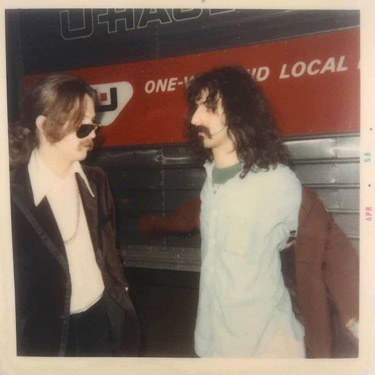
[Eric Clapton, FZ]
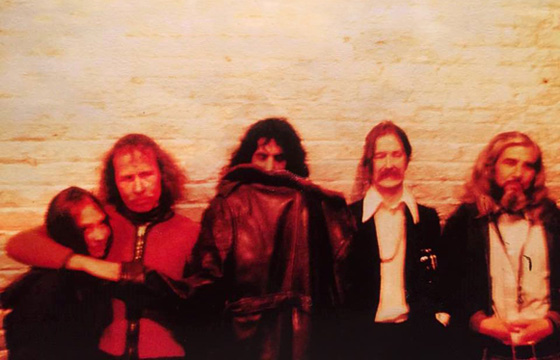
[unidentified girl, Don Preston, FZ, Eric Clapton, Bunk Gardner.]
As we pulled up outside the Chicago Coliseum in two station wagons, Cream pulled up in three limousines! They had a limo each because those guys weren't even speakin' to each other by that time. [...]
We also met Cynthia Plaster Caster at that show.
While in Chicago, Eric Clapton had introduced Frank to Cynthia Plaster Caster, a girl who not only made plaster-casts of rock stars' penises, but also kept detailed diaries of the proceedings. Frank brought three of the treasured books for me to transcribe as well as a tape of his interview with her.
I met Cynthia Plaster-Caster when the Mothers were working as the opening act for Cream at the International Amphitheatre in Chicago in 1968. This was toward the end of Cream's existence, when all the guys in the band hated each other. Each guy had his own road manager, his own limousine, his own etc., etc., etc.
During a conversation backstage, Eric Clapton asked if I had ever heard of the Plaster-Casters. I said I hadn't. He said "Well, after the show, come with me. You won't believe this." So, we went to his hotel.
Upon arrival we found, sitting in the lobby, two girls. One of them had a small suitcase with an oval cardboard emblem glued to the side that said "THE PLASTER-CASTERS OF CHICAGO." The other one had a brown paper bag.
They didn't say a word—just stood up and followed us into the elevator, and into the room. The suitcase girl opened the suitcase. The other one opened the bag. They took out some 'statuettes': "Here's Jimi Hendrix, and here's Noel Redding, and here's the roadie from . . . "
They put them on the coffee table and took out the rest of their gear—everything a person might need to make a plaster replica of the human weenus.
We spent two or three hours talking with them. Neither of us volunteered to be 'immortalized.'
Eric Clapton introduced me to the Plaster-Casters. They had all these statues of the dicks of people like Jimi Hendrix. One of them mixed the plaster stuff to make a mold, and the other gave the guy a blow job. She took her mouth off the guy's dick, and then the other one slammed the mold onto it. We declined to be enshrined, so to speak.
April 28, 1968—Grande Ballroom, Detroit, MI
The next day, we flew to Detroit's Grande Ballroom with MC5 supporting again.
The first time I saw The Mothers I was opening for them; it was the second or third gig the Stooges had ever done, so I remembered us more than them. I think playing with them so early in our career pushed me to be weirder faster, and also to be stranger to look at, earlier than I would have been otherwise. That night I did my first stage dive. I knew the Mothers were on after us, and I didn't want people to forget about us.
I think I [invented stage diving]. The first one I did was in 1968, it was the second show I ever did, and I was opening for Frank Zappa, for the Mothers of Invention. And I couldn't think of another way to get attention and I did this thing—ever seen how little boys sometimes when they want attention, they'll make themselves perfectly stiff and then they'll just fall flat-faced on the floor?—I did that, except off a five-foot stage.
May 3, 1968—The Dog, Denver, CO
After [Detroit], Art and I caught the plane back to Cincinnati and picked up my car and Lady [the dog]. Then we drove 800 miles west [...]. We headed on to Phoenix and found somewhere to board Lady because we had to meet the rest of the band again in Denver, Colorado.
Chet Helms, from the Family Dog, had just set up a new venue in Denver.
May 4, 1968—Star Theatre, Phoenix, AZ
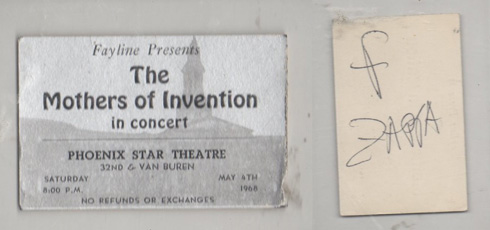
After the [Denver] show the next morning, we flew back to Phoenix [...]. I had a real nice visit with my Mom and when she came to the show that night, Frank calmed things way down and dedicated the show to her, to Mrs. Black. She got a front row set, Man! The Spiders were opening for us—they turned into Alice Cooper later on.
Most of the time it's not fun at all. Take a peculiar example like last night's concert at Phoenix. The audience was very drunk, and there was one guy who was pressed right up to the stage in front who was vomiting, which is a little tough to watch while you're singing.
May-September 1968—2401 Laurel Canyon Blvd.—The Log Cabin
Frank Zappa Sessions Information, compiled by Greg Russo, August 2003
Address shown for 06/04/68 session: 2401 Laurel Canyon Blvd., L.A.
Michael Walker, Laurel Canyon: The Inside Story Of Rock And Roll's Legendary Neighborhood, 2006, p. 33
By the time the Mothers returned from their eighteen-month residency in New York, Zappa and Sloatman were married and the parents of the infant Moon Unit. Gail had come back in advance to house-hunt. Before the move to New York she and Frank had lived together in a house in the Kirkwood Bowl, and now his instructions were explicit. "Frank wanted to live in or near the canyon," Gail says. "Laurel Canyon has historically attracted musicians and people very highly involved in the arts, and usually people that didn't come by who they were with their hands held out or expecting other people to pay the freight." As it happened, Franzoni was about to move out of the cabin. The dance concerts in the living room were petering out as complaints about the noise brought the police to the landlady's door this time. "The police were bugging her more than they were bugging me, and that was the end of that," he says. "We decided to get out of there. Gail was looking for a place, and I said, Y'know, we're moving out of here, so we'll vacate it."
Frank Zappa wanted to live in the log cabin, and I guess he had clout with the mad-as-a-hatter landlady, because Karl and the girls were ousted from the basement and forced to seek accommodations elsewhere. It was easy to dig up a pad around town in a day or two for seventy-five a month, no first and last, no cleaning fee, and no questions asked, but it was no fun to leave the log cabin. It was a real and true log cabin, built with actual logs on a ton of acreage, complete with a stream and minilake, caves, hideaways, blossoms of every scent and shape, creating vines to swing on from end to end. There was supposed to be a secret passageway that led to Houdini's castle across the street, and we were still searching. It was truly Disney time, and we had no intention of staying away for very long. Lucy knew Frank from New York; how intimately we never found out because she did nothing but allude. She kept her big red mouth shut about that one, because Frank had a divine wife, Gail (who later became mentor), and a brand-new baby daughter, Moon Unit.
[...] When Lucy suggested that we all drop in on Frank at the cabin, I was beside myself with anticipation. When we arrived, he was sitting at the piano in the cavernous living room made of actual logs; there was a fire crackling in the huge rock fireplace, and little baby Moon was crawling around the floor, gurgling. I heard clattering in the kitchen and figured Gail must be in there, churning out a fantastic dinner for her bril^ liant husband. It was beyond idyllic, right out of an ersatz version of House Beautiful. He was genuinely thrilled to see Lucy, and picked her up off the ground and hugged her until her back cracked; when he came over to meet her new best friends, we all curtsied for him as though he were a reigning monarch. I got all tongue-tied and cross-eyed when we met, but he didn't seem to notice; actually, he seemed quite enchanted with us. [...]
Gail came out of the kitchen and I tried not to stare. She asked all of us if we would like a cup of tea; oh, it was so civilized. [...] While Frank probed our brains for interesting info, Christine busied herself tidying the enormous pad. Moon crawled up to her and she slung the baby girl on her scrawny hip and kept tidying. This must have impressed Gail because she offered Christine a full-time live-in position, taking care of Moon, complete with household tasks. This was a very enviable position for an eighteen-year-old wack-job from San Pedro in 1968. This wonderful occurrence, of course, clinched our friendship with the Zappas and we started spending a lot more time at the log cabin, our home sweet home away from home.
I soon realized that the first quiet evening we spent there was a rarity; the house always had a Mother or two in residence, and Frank's manager, Herbie, was in and out all day and night. They were forming their own record label, Bizarre, and floods of secretaries and assorted business types came and went. Many freaks and hopeful happeners appeared at the infamous doorstep and were sometimes invited in for tea. Frank's in-house artist, Calvin, a buzz-haired beauty, sat in different locations in and around the house, sketching outlandish interpretations of each Mother, while my darling Sandra made goo-goo eyes at him one time too many. The result eventually became a protruding hand-painted tummy, which turned out to be a ravingly beautiful baby girl she called Raven.
It was about 10:30 p.m. on a Sunday, May 5, when I phoned Los Angeles to see if my brother, Frank had arrived from New York.
"Gail's found a great house in Laurel Canyon. It's in the hills overlooking Hollywood. It has fourteen bedrooms, seven bathrooms and caves underneath which we'll turn into a recording studio. [...] There is also a swimming pool, and get this, it has a tree house."
[...] "It sounds wonderful."
"Can you get yourself there, say May fifth? That will give you a day to settle in before I arrive on the sixth."
[Log Cabin—c. May 5, 1968] I said as casually as I could, "So, has Gail just arrived?"
"No. She's been here three days. She moved in Wednesday [May 1]."
Cal Schenkel, quoted by Peter MacKay
He only lived there May through September 1968 anyway, you know—but that was quite an incredible summer!
There were seven of us living at the log cabin: Frank, Gail, PamZ, Calvin and me, plus Ian Underwood and Dick Barber, both of whom had set their sleeping bags up in the basement. Dick was a friend of Frank's brother, Bobby. His job was to look after the house, help with shopping and errands and guard us while Frank was on tour.
When we returned to California in 1968, we moved into a large log cabin, once
owned by old-time cowboy star Tom Mix, at the corner of Laurel Canyon Boulevard
and Lookout Mountain Drive.
The living room was seventy-five by thirty feet, with a huge fireplace. Close
to a dozen people, mostly employees, lived there. The rent was seven hundred
dollars a month.
Cal Schenkel had his own little art department in one wing of the house. In
the basement was a one-lane bowling alley and enough space for the band to rehearse.
It had two walk-in safes—like bank vaults—and a subbasement which had probably
been a wine cellar. It was rustic and decrepit; it really looked like
an old-time log cabin, with rough-hewn wood, bristling with splinters.
[...]
The residents at that time included my wife, Gail; my secretary, Pauline Butcher;
our road manager, Dick Barber; Pamela Zarubica; Ian Underwood; Motorhead Sherwood;
and a girl named Christine Frka—the woman on the cover of the Hot Rats album
crawling out of the crypt.
Christine Frka was our baby-sitter, along with Pamela Des Barres. Moon was
about eight months old, and Dweezil hadn't been born yet.
May 1968: early morning in the sprawling, 18-room log cabin on the corner of Laurel Canyon Boulevard and Lookout Mountain Drive where the famous 'freak-out' artist Frank Zappa lives. [...]
Now Frank is sleeping. As are most of the other people who share the house with him: his English secretary Pauline Butcher, his former girlfriend Pamela Zarubica, his recording engineer Dick Kunc, designer Cal Schenkel, tour manager Dick 'Snork' Barber, and Mothers Of Invention band members Ian Underwood and Jim 'Motorhead' Sherwood. Then there are those non-residents, famous and not-so, sleeping in various nooks and crannies, or just stretched out in front of the huge stone fireplace, beneath the 14-candle chandelier.
The only person up at this hour is Zappa's 23-year-old wife, Gail, who tiptoes around the bodies with their eight-month-old baby daughter, Moon Unit, under her arm.
May 10-11, 1968—Shrine Exposition Hall, LA
Gene Youngblood, "Pop Consumer Report: The Best Uses Of Electricity," LA Free Press, May 3, 1968
Next weekend, May 10-11, High Torr will present The Mothers of Invention [at the Shrine Expo] in their first Los Angeles concert since taking New York by storm. With the simultaneous release of We're Only In It For The Money and Lumpy Gravy, there can be no doubt that Frank Zappa stands side-by-side with Bob Dylan, John Lennon and Paul McCartney as one of the leading talents of pop music.
The next day, Friday, the house buzzed as the Mothers hauled their equipment out to the enormous truck ready for their first concert at the Shrine. [...]
Two other groups opened the show, harmonica player Charlie Musselwhite, with his Blues Band, whom Frank and I watched from the side of the stage while everyone behind us chatted and hob-knobbed; and Sweetwater, whose wailing female singer was just too weird for my taste.
Then the Mothers ambled on, endlessly tuning up their instruments, but once they got started I thought they were fantastic, covering every different kind of music from doo-wop to jazz, from rock'n'roll to progressive classical. Add in comedy routines that made me laugh aloud, and you had complete entertainment. [...]
Eric Clapton, who'd quietly mingled with everyone on the side of the stage, walked on and played a solo, but little enthusiasm or applause greeted him even after Frank, at the end, announced his name. I felt somewhat vindicated. I was not the only person ignorant of Eric Clapton.
During another number, Carl Franzoni led the freaks onstage. Their flamboyant dancing with its sexual overtones astonished the audience. [...]
The next evening [...] Gail woke me at eleven, just in time to see the second show.
We came back and played at the Shrine Exposition Hall in L.A. and that's where Eric Clapton sat in with us and naturally we jammed some blues.
May 18, 1968—Gulfstream Race Track, Hallandale, FL
Although the Blues Image ran Thee Image, one of the key participants was a promoter named Marshall Brevetz. He seems to have been a big mover and shaker on the Florida rock scene in 1968. He organized two outdoor concerts in 1968 at Gulfstream Park (May 18-19 and December 28-30) in Hallandale, FL. Hallandale is fairly near to Thee Image. The Dead played the Hollywood Pop Festival in December 1968 (Hollywood is a small town near Hallandale). Brevetz worked with future Woodstock promoter Michael Lang on these concerts.
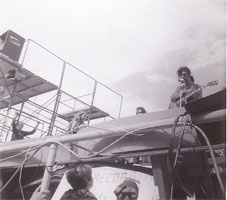
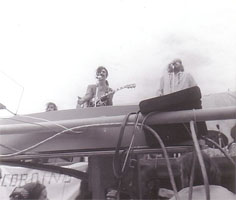
© Kramer Archives
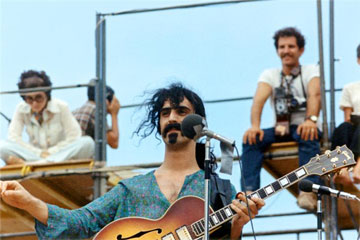
I saw [Jimi Hendrix] at the Cafe Au Go Go when he played with us and at a pop festival in Miami where we worked with him. That's when he burned his guitar and I got it about a year-and-a-half later from the guy who used to be one of his roadies, a guy called Howard Parker. We also jammed with him at this little club called The Castaways or something like that in Miami because all the groups who were playing at the festival were staying at this same hotel. And there was a bar and we had a jam session there. Yeah, I think he was good. I enjoyed playing with him.
I remember on the first day we were right in the middle of our show when Hendrix came and landed in a helicopter behind the stage. It was so loud that we had to stop playing and wait for the thing to quieten down. The band just stopped and as soon as it was all over, we just continued where we'd left off.
Most of the bands stayed at the same hotel called The Castaways and there was a bar in there. After the last show of the night, the place was full of musicians and groupies. The resident band had already done their thing, so they let us use their equipment and we just jammed some blues.
I got to play with Hendrix again which I always enjoyed. [...]
That's the first time I met Arthur Brown and saw him set his head on fire.
Kees de Lange, "Mr. Satire & Mr. Phenomenon," UniVibes #27, December 1997
Frank and Jimi met again in New York in 1968. In the 9
May 1968 issue of the Village Voice appeared an advertisement for
The Scene club stating . . . "We got together the other night. TRAFFIC
played. They were great. You could have come. The Jimi Hendrix Experience,
Fat Frankie . . ., Zappa, Yardbirds, Chas Chandler . . . and even I [Steve Paul]
managed to come."
A few weeks later, on Saturday, 18 May
1968, both Zappa and Hendrix performed at the 'Underground Pop Festival'
on the Gulf Stream Race Track, Hallandale, Florida, along with Arthur
Brown, Blue Cheer, and John Lee Hooker. Next day all performances were
cancelled due to horrendous rainstorms. So the musicians all fled to a
little coastal hotel called the Castaways Hotel, where Jimi, Noel, Frank,
Jimmy Carl Black [Zappa's drummer], and Arthur Brown had a jam at The
Wreck Bar. Michael Jeffery's secretary Trixie Sullivan was among the
spectators . . . "They had a jam session that night. Who else was there, oh,
John Lee Hooker, Frank Zappa—it was absolutely incredible . . . " It was
also here in Florida that Frank Zappa obtained the burned remains of the
so-called 'Hendrix Strat'.
The encounter in Miami turned out to be the
last time Frank and Jimi saw each other.
June 1, 1968—San Diego, CA
The Mothers of Invention brought their attack on all things phony to San Diego Saturday night and left 3,000 San Diegans laughing uproariously—if somewhat nervously—at their satirical spoofs of American life.
The Mothers, making their first local appearance, turned in one of the most stimulating and entertaining rock performances in many months.
The nine long-haired and gaily garbed Mothers, playing saxophones, drums, gongs and guitars—all channeled through several mysterious brown boxes on stage—produced a sound that nearly defies the tag "rock 'n' roll."
The music runs from fragmented, avant-garde electronic wails to saccharine-sweet, swinging sounds of the 1950s progenitors of the new music. All of it punctuated by the yelps and howls of the Mothers.
Head Mother Frank Zappa, spiritual leader of the band and the rock genius who writes most of the compositions, gave the lead to Ray Collins, who handled the vocals beautifully.
Collins, who seemed to be half musician and half-mime, delighted the crowd with acerbic musical broadsides at high school life, the news business and Broadway's pathetic playlands and shooting galleries.
The Mothers are all accomplished musicians who do not sacrifice their abilities to indulge in their acid commentaries on the American life style.
[...] The Mothers capped a fine performance with a shortened version of their tour de force, "King Kong," which has run up to 70 minutes at other places.
July 1968—Mick Jagger
Michael Walker, Laurel Canyon: The Inside Story Of Rock And Roll's Legendary Neighborhood, 2006, p. 37
Gail insists the well-traveled story that Zappa booted Mick Jagger and Marianne Faithful from the cabin for inebriation is not true. "What I recall is that [Jagger] came over with Marianne Faithful, and she spent a few minutes demonstrating her ability on the tambourine and then pulled her clothing apart to reveal the bruises it caused on her ass and on her hip. That was very exciting. I also remember that Frank had gotten a splinter in his foot—we were all walking around barefoot, and there were these wood floors that hadn't been taken care of—and Mick Jagger got down on his hands and knees and grabbed Frank's foot in order to see what kind of assistance he could offer. Frank was really taken aback by that. I have very strong feelings about it—it was very genuine and very spontaneous."
On the day Mick Jagger stopped by for his first visit, one of the above-mentioned splinters crammed itself into the end of the big toe on my right foot, just as I was making my way to the door.
I greeted Mr. Jagger, hopping on one foot. He asked why I was behaving in this manner. I told him about the splinter and hobbled over to a chair. He followed, got on the floor in front of me, located the little wooden tormentor and removed it. We spent about an hour after that discussing European history.
News had travelled all around Hollywood that Mick Jagger would visit Frank, and freaks from everywhere had besieged the house. Apparently, when Mick and Marianne Faithfull walked in, twenty people lazed casually in the living room, and although it was not unusual for the house to be overrun, it was unusual for visitor to collect together in one place. Frank had made no protest.
July 1968—Jam Session with Mick Jagger
[The day after Mick Jagger's visit], by the evening, things had calmed down and while the Mothers readied for their rehearsal, the house gradually filled up with the usual myriad of visitors. Christine introduced Frank to a fresh-faced twenty-year-old called Alice Cooper. They stood holding hands and looked like twins from a comic strip, all stretched-out with skinny arms and legs. Frank agreed to audition Alice's band the next day at seven o'clock.
Captain Beefheart and some of his band arrived, as did the usual motley crew of GTO's. Even Herbie and Mutt made an appearance. Then, in amongst all of this, PamZ nearly flipped when Mick Jagger and Marianne Faithfull snaked back in. From what I learned later, an evening of pulsating, throbbing, thunderous music followed, with Mick Jagger and Captain Beefheart competing for supremacy on vocals.
After the audition Don and I jumped into his car, this big old bitchin' Mark IV Jaguar, and drove into Laurel Canyon to Frank Zappa's house. [...] I think Absolutely Free had been done, I don't think We're Only In It For The Money had been released yet. So we go down to Frank's place—Tom Mix's old house in Laurel Canyon. There's tons of people hanging around in this big old log cabin and I'm pretty nervous. So we went downstairs and ran into Frank. He was very cordial and animated and there's people everywhere. Women were all over the place—what an experience!
It turns out Frank was trying to put together this Rock 'n' Roll Circus thing, which The Stones later put together without him. I don't know how many Rolling Stones were there at the time, but Mick Jagger certainly was, as were The Who and Marianne Faithful. She was so ripped she was drooling—but what a babe—I was star struck! [...]
Downstairs at Frank's was the first time I saw Art Tripp. He had just joined the Mothers and he was playing drums. Frank was rehearsing some tunes with a string section, clarinets and various other session players. Also, there was a one lane bowling alley down there! [...] I ended up in this jam session in a circle of people about six or seven feet apart and we're playing "Be-Bop-a-Lu-La"! Don was to my immediate left wearing his big madhatter hat and to his immediate left was Mick Jagger and right around the circle all these people were playing, Frank included.
So I'm jamming with these guys almost too nervous to be able to move or breathe. I started to ease up after I noticed that Jagger seemed to be equally intimidated. Then we went into Muddy Waters' "Rollin' & 'I'umblin'" and a couple of blues things and that was it. It was such a strange experience—somehow just out of nowhere I'm down in Hollywood meeting Frank Zappa and this whole entourage of famous people like Jagger, Marianne Faithful and Pete Townshend. What an audition! There I was 19 years old and I'm very taken with these big important people.
I remember (Frank) coming down the big stairway that was in the center of everything—like a movie or something . . . it was a big day for me because Jagger and the Who and all (were there)—because (Jagger) was putting that Rock And Roll Circus thing together.
c. July 6-25, 1968—Sunset Sound, LA—Beggars Banquet mix
The next evening [after the jam session] Marianne Faithfull [...] invited us, with her usual flurry of arm-waving and over-the-top gestures, to Sunset Sound Studios to watch Mick Jagger mix the Stones' latest album, Beggars Banquet. [...]
Frank and Gail joined Mick, Keith Richards, their producer Jimmy Miller and sound engineer Glyn Johns at the mixing board. Politely, Frank watched Mick at work, although very soon he was pitching in with suggestions and ideas. Maybe that's why Keith Richards seemed to lose interest halfway through and withdrew with his girlfriend Anita Pallenberg. Anita, very pretty, full-fringed, tall and waif-like, seemed more serious than Marianne and sat at the desk adding her own ideas on many of the run-throughs. At other times, she and Marianne chatted to the GTO's, Pamela, Sparkie and Lucy, or they hob-knobbed together like close friends, whispering and giggling.
We heard versions of "Jigsaw Puzzle," "Salt of the Earth" and "Street Fighting Man."
Bizarre
That first independent label deal was as a result of a lawsuit that was brought against MGM. They were happy to give me an independent deal because we had caught them doing something with the books that was not . . . right. So they figured you know, this stuff will never sell, he'll be out of business in 15 minutes—let him do it.
Eventually, MGM made an 'innocent mistake': they missed an option pickup. They forgot to send us the little piece of paper that says, "We
pick up your option—you are still under contract to us—we still
want you to make records for us."
With that as leverage, we negotiated a 'logo deal.' Bizarre Productions
was created: a label within the MGM company structure—a semi-independent entity—and
so Cruising with Ruben & the Jets and Mothermania were released
on the Bizarre/Verve label, distributed by MGM.
I filed a suit against [MGM] right around the time that the deal was up for renewal. There'd been a certain boost in sales right around that period with We're Only In It For The Money, which did a lot better than the first two albums. They didn't really want us to go, but their royalty statements were in the realm of science fiction. So anyway, by a stroke of luck (namely their failure to pick up the option) we were able to get out of that contract.
Well, due to a peculiar circumstance, somebody at MGM forgot to pick up the option on our contract, so we shopped around various other record companies for a deal on our own label. We went to Columbia and they offered us a certain amount of money which we did not feel was adequate, so we kept on looking and finally got a good offer from Warner Brothers which we accepted. We got a good deal all the way round from Warner's.
One of the most interesting aspects of our deal is that we own our masters. At the end of the contract with Warner Brothers we get our masters back and that's what I call a good deal. That's one of the most appealing things anybody could write into a contract. A person makes a record and what normally happens is that the record company owns the tapes—it's not your music anymore. I happen to like the idea of maintaining possession of the so-called works of art I'm involved in. Warner's have a five-year sell-off period on the items and then all the master tapes revert to us.
Neil Reshen, Frank and Herbie's new business manager, a whiz-kid from New York, had flown over especially for the meeting [...]. He told us about the deal he had struck for Bizarre Incorporated, a company that would oversee Bizarre Records, Bizarre Advertising and Bizarre Films. The Mothers would release one more album for MGM and then transfer to Bizarre. Frank and Herbie would be fifty-fifty partners with Frank acting as president, Herbie as vice-president and, for his efforts as their business adviser, Neil Reshen would handle all the finances and cream five percent off the top.
[July 24, 1968] Frank invited me to another meeting. Neil Reshen, Frank, Mutt, Herbie and Herbie's wife, Suzie [...] sat around a table at Perino's [...]. Neil Reshen [...] said, "We've acquired offices for Bizarre Records on the seventeenth floor at 5545 Wilshire Boulevard, three rooms and a reception area. We take over the lease in two weeks' time but expect to begin business on August nineteenth. We've employed Rick Shaw to set up the office, order the furniture etcetera, and Pauline will help him in this task. Two secretaries will be employed. Herb Cohen will occupy the first office, I will visit two or three days a month and occupy the second, and Grant Gibbs, in charge of publicity and promotions, will use the third."
Bizarre Inc.
Frank Zappa, leader of the Mothers of Invention, MGM/Verve group, has formed Bizarre, Inc., an entertainment combine.
Bizarre, established with Herb Cohen, manager, plans to build an artist roster around avant-garde/contemporary acts. The Mothers of Invention have a contract with MGM/Verve that expires Oct. 1.
The company will have seven divisions, including Bizarre Records, publishing, TV radio programming, management, motion pictures and advertising/public relations. Zappa's publishing company is Third Story Music.
Aimed at the album market, Bizarre product will be distributed in the U. S. by Warner Bros.-Seven Arts Records.
The management arm represents Tim Buckley, Linda Ronstadt [and the Stone Poneys], the Mothers of Invention [...] and Fred [Neil].
Grant Gibbs, formerly West Coast advertising & publicity director for MGM/Verve Records, has been appointed marketing director for Bizarre. He'll direct Bizarre's advertising, sales, promotion and publicity division.
August 1968—Ray Collins Quits
[Art Tripp] said that Ray Collins had to leave the band once because he caught hepatitis, and that he was thinking of quitting anyway.
Zappa had effectively assumed control of the band, leading to tension. Collins had been ambivalent about the Mothers ever since Zappa relocated the band from Pomona to Hollywood to pursue a record deal.
Under Zappa, the Mothers weren't the same band Collins had signed up for. Quitting became a running joke.
"I think I did it four times, maybe," Collins says. "I didn't like doing that stuff onstage. Too much comedy, too much making fun of stuff."
While clowning around was part of his personality, "I wanted to make beautiful music. I was raised on Johnny Mathis and Nat King Cole."
He does regret quitting precisely when he did: The band was headed to Seattle [August 24, 1968], and he still has never been there.
It was in 1968. We were in Chicago [August 14-17, 1968] driving to the gig. Ian was driving. Frank was in the shotgun seat, and Ray and I sat in the back seat. We'd been laughing and joking, when all of a sudden out of the blue, Ray said, "Frank I think I'm going to quit the band." There was a stunned silence. I got a sick feeling in my stomach. Frank finally asked him when he was going to leave. That was his last tour, although Ray played a few gigs with us again in California. I recall one in San Diego [April 12, 1969] just after that idiot from the Doors had exposed himself on stage [March 1, 1969]. Ray made some great stage jokes about the guy at that concert.
To me, Ray was the soul and spirit of the Mothers. He not only had a great voice, but his limitless sense of humor, and his odd way of looking at things made him a joy to be with both on and off stage. When he left, it really was never the same again. He performed both the satire and difficult charts so well, that I never knew until much later that he really didn't like doing that stuff.
Ray has always been a true vagabond, and resisted being tied down or being told what to do. He loved to sing, and he never gave a damn about money. We still correspond once in awhile. And Ray is just as contented today as he ever was.
Ray's last stint was during the summer of 1968. It was a tour of the Midwest. Him and Frank weren't getting along, nothing new. [...]
During the tour Ray got Hepatitis and of course he turned yello, a sort of gold color. He was really ill but he managed to finish the tour.
IT: Ray Collins was fantastic.
Z: He was good—he didn't enjoy singing [my lyrics]—in fact one of the reasons he left the group was that he didn't like the songs—he hated them.
December 1968—The Tigers in Los Angeles
I met a Japanese rock band once, but didn't hear their music. They were called the Tigers, and we met at Whisky A Go Go in Los Angels about eight years ago. They didn't speak English and I didn't speak Japanese, so I just waved my hand to them.
[note: The Tigers were a Japanese pop group in the '60s. Some sources tell that they visited the U.S. in Dec. '68, so it might be around that time when FZ happened to meet them.]
Tan Mitsugu, August 3, 2022
As it turned out, however, there's a photo of the Tigers visiting FZ's house (probably published on one of Japanese teen magazines at the time):
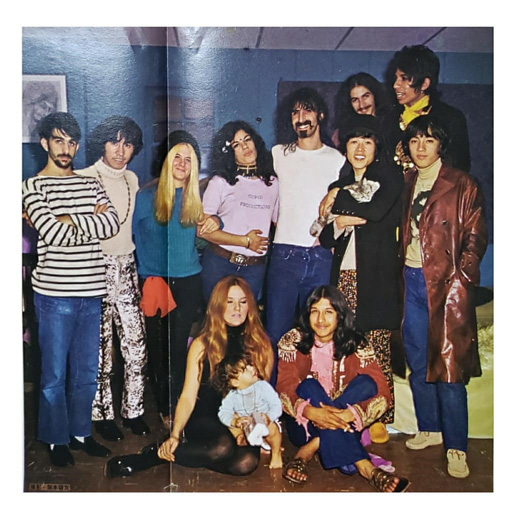
[7885 Woodrow Wilson Dr, Los Angeles, CA. Back row, far right, standing: Calvin Schenkel, Bernardo Saldana; middle row, standing: Carl Zappa, Kahashi Katsumi, unidentified girl, Lucy Oferrall, FZ, Hitomi Minoru, Sawada Kenji; front row, seated: Janet Ferguson, Moon Zappa, Carlos Lozano.]
Kahashi recalled this visit in a 2013 interview:
"I once went to Frank Zappa's house. I think it was 1969. I went to Whisky-A-Go-Go in Los Angeles and the Monkees were there and we were hanging around with them. Then I met some hippies there, and one of them said, 'Let's go visit Zappa,' so we went to a house up in the mountains in Beverly Hills. Zappa came out and seemed to welcome us, with the 'oh, you guys came here to hang out?' kind of vibe. He said, 'I'm working on writing music now, and my wife and kids are out, so I can't take care of you, but please make yourself comfortable as you like.' I thought, 'What a nice man!' He was a very gentle, very kind and well-educated person, almost like a university professor.
"The basement of his house was a recording studio, and he was writing music in the mixing room of the studio.
"He told us, 'We're going to do a concert downtown in a couple of days, so come to see us,' so we went to that concert. It was great."
According to a biography of the Tigers (written by Isomae Junichi, published in 2013), the band went to the U.S. to make TV ads in December 1968. This book is mainly based on the magazines that were published around their heyday, and tells the order of the events differently ("The Tigers went to see Frank Zappa's concert, hit it off with the members of his band and were invited to visit their house"). In any case, it is confirmed that the Tigers arrived in Los Angels on 12/4 and left LA for NYC on 12/7. So it's most likely that they saw the MOI's concert at the Shrine Exposition Hall on 12/6.
A long time ago. The Tigers from Japan. They were as big as the Beatles in Japan at the time. They were on their way to do the Ed Sullivan show. They didn't speak English nor did we speak Japanese. We met them outside the Whisky and brought them up to meet Frank Zappa.
Comments:
Cal Shenkel remember them. We drove them around in Sparkie Parker's Hudson.
Don't know who the blonde person is. Look at little Moon Zappa on my lap.
It was taken at the house. I lived there then.
[Me and Lucy] and Bernardo. You knew him? He was a BTO. Ha
I got sad thinking about the people in the picture who are gone. Carl, Lucy, Frank, Bernardo & Carlos.
Tan Mitsugu, October 4, 2024
I found that Sawada contributed a short travelogue to the 1969/1/7-14 issue of the Japanese "Seventeen" magazine, mentioning "Carlos, Lucy, Bernardo and Sparkie" as his new "hippy" friends.
Informant: Tan Mitsugu.
Special thanks to Javier Marcote.
